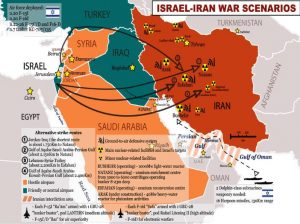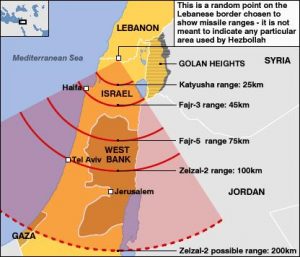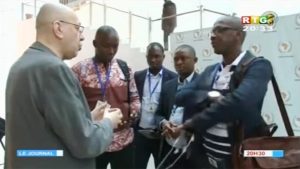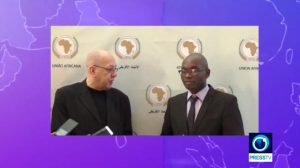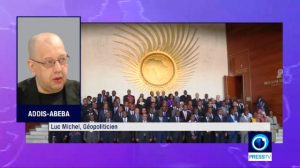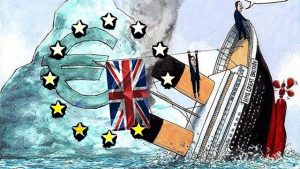LUC MICHEL (ЛЮК МИШЕЛЬ) & EODE/
Luc MICHEL pour EODE/
Quotidien géopolitique – Geopolitical Daily/
2018 01 02/
“Being taught by the enemy is an honor and a duty”
– General Karl Hausofer (1869-1946),
the geopolitician of the “Continental Blocks”.
HOW TO READ GEORGE FRIEDMAN ON THE CENTRAL QUESTION OF RELATIONS BETWEEN MOSCOW AND TEL AVIV?
Yesterday I was dealing with the issue (central in the Middle East) of Israel-Russia relations. Here it is, seen from the USA (1), by George Friedman (former boss of STRATFOR, who is now managing the think tank ‘Geopolitical Future’). Interesting theme on what Tel Aviv and Washington are waiting for. The title chosen by Friedman, “Israel’s Russia Gambit”, is significant of the geopolitical bet attempted by Netanayhu. The “Gambit” is a risky opening option for chess …
The previous geopolitical cycle had seen, since the implosion of the USSR, Moscow manifest a benevolent neutrality vis-à-vis Tel Aviv. The Russian victory in the Syrian war alongside the Axis of Resistance – Damascus, Tehran and the Lebanese Hezbollah – the Eurasian alliance Moscow-Beijing which is moving towards a Moscow-Peking-Tehran axis, but also the the close alliance between the US and Israel and the hostility of the Israelis to Assad’s Syria (2) have changed all that.
Despite a diplomatic-political forcing of Netanyahu, full of clumsiness (including attempts to pressure Moscow, the gap between Russia and Israel continues to deepen.These clumsiness, there is the Israeli media campaign, fueled by the IDA’s disinformation agencies (like ‘Debka’), in an attempt to persuade the Russians of the “harmfulness of the Iranian alliance.” In vain, Tehran being one of the geopolitical pivot of the Eurasian expansion (3) …
The essential strategic presence of the Russian naval base in Syria and geopolitical alliance, also essential, with Tehran in Caspian and Eurasia, here is why Israel weighs little in the Eastern equation of Moscow … And that’s why, what Friedman does not say, Netanahyu will lose his bet!
* Read also in French on LUC MICHEL’S GEOPOLITICAL DAILY/ GRAND JEU AU PROCHE-ORIENT: POUTINE ‘NOUVEAU TSAR’ DE L’ORIENT (III).
LA FIN DE LA NEUTRALITE BIENVEILLANTE AVEC ISRAEL
* Résumé français :
Comment lire George Friedman sur la question centrale des relations entre Moscou et Tel-Aviv ?
Je traitais hier de la question (centrale au Proche-Orient) des relations Israël-Russie. La voici, vue des USA (4), par George Friedman (ex patron de STRATFOR, qui dirige aujourd’hui le think-tank ‘Geopolitical Future’). Thématique intéressante sur ce que Tel-Aviv et Washington attendent du dossier. Le titre choisi par Friedman, « Israel’s Russia Gambit », est siginificatif du pari géopolitique tenté par Netanayhu. Le « Gambit » est une option d’ouverture de jeu risquée aux échecs … Le cycle géopolitique précédent avait vu, depuis l’implosion de l’URSS, Moscou manifester une neutralité bienveillante vis-à-vis de Tel-Aviv. La victoire russe dans la guerre de Syrie aux côtés de l’Axe de la Résistance – Damas, Téhéran et le Hezbollah libanais – , l’alliance eurasiatique Moscou-Pékin qui s’oriente vers un Axe Moscou-Pékin-Téhéran, mais aussi l’alliance étroite entre les USA et Israël et l’hostilité des israéliens à la Syrie des Assad (2), ont changé tout cela.
Malgré un forcing diplomatico-politique de Netanyahu, plein de maladresses (notamment des tentaives de pression vers Moscou, le fossé entre la Russie et Israël ne cesse de s’approfondir. Parmi ces maladresses, il y a la campagne des médias israéliens, alimentés par les officines de désinformation de Tsahal (comme ‘Debka’), pour tenter de persuader les russes de la « nocivité de l’alliance iranienne ». En vain, Téhéran étant un des pivot géopolitiques de l’expansion eurasiatique (3) … Présence stratégique essentielle de la base navale russe en Syrie et alliance géopolitique, elle aussi essentielle, avec Téhéran en Caspienne et en Eurasie, voici pourquoi Israël pèse peu dans l’équation orientale de Moscou … Et voilà pourquoi, ce que ne dit pas Friedman, Netanahyu va perdre son pari !
# “ISRAEL’S RUSSIA GAMBIT”
BY GEORGE FRIEDMAN
(GEOPOLITICAL FUTURE, JANUARY 31, 2018)
“Israel’s strategic imperative is, above all, to avoid a war with all Arab powers at the same time. Israel’s army is limited in size and ability to absorb casualties in a war along the country’s entire periphery”
Excerpt 1/
Israel’s strategic imperative:
“Israeli Prime Minister Benjamin Netanyahu met with Russian President Vladimir Putin in Moscow on Jan. 29 and told Putin that Iran is trying to turn Lebanon into a vast missile manufacturing base. I have written on the rise of Iranian power following the defeat of Islamic State forces in Iraq and Syria, and have raised the question of how Israel and Turkey will respond to Iran’s emergence as a major power in the Arab world. We are now beginning to see the Israeli response.
Netanyahu had told Putin when Russia intervened in Syria that Israel understood Russia had interests in Syria and would not interfere with the Russian presence there. He also told Putin that Israel too has interests in Syria and that chief among them is limiting the Iranian presence. The implication behind that statement was that Netanyahu was going to Moscow to call in his chits.
Israel’s strategic imperative is, above all, to avoid a war with all Arab powers at the same time. Israel’s army is limited in size and ability to absorb casualties in a war along the country’s entire periphery. The nightmare scenario for Israel is far from materializing. Egypt has no interest in fighting Israel and is cooperating against jihadists in Sinai. Jordan remains dependent on Israel for its national security. Until recently, Israel was more secure than it had ever been. In addition to security along its Jordanian and Egyptian borders, Syria was in chaos and Hezbollah was fighting in Syria. That meant that neither Syria nor Lebanon posed a threat, and that Israel’s entire periphery was secure.”
Excerpt 2:
“The defeat of opponents of the Assad regime has changed Israel’s strategic reality”:
“The defeat of opponents of the Assad regime has changed Israel’s strategic reality. It is not simply the Russians operating in Syria, but also the Iranians, both directly and through their Lebanese proxy, Hezbollah. Hezbollah forces supporting the Assad regime were severely weakened during the fighting, taking heavy casualties. Now that the fighting has subsided, Hezbollah has been working hard to rebuild its strength, supported by Iran. Separately, Hezbollah in Lebanon is focused on Israel. Therefore, Israel, which fought a war with Hezbollah in 2006, now has to view Lebanon, and Syria as well, as an evolving Iranian base.
The war in 2006 did not go particularly well for Israel. Hezbollah proved a capable defensive force, holding a line against an Israeli assault on its positions in southern Lebanon, and also firing rockets deep into Israeli territory. Hezbollah came through the war relatively intact, while Israel had to reconsider its military doctrine. The Israelis have no desire to repeat 2006, even with a new doctrine. On the other hand, Israel cannot afford a rocket and missile barrage from Lebanon. Although Hezbollah and the Iranians have had ample time to build structures to protect the rockets and missiles, an air campaign by Israel is unlikely to destroy all of them. Meanwhile, an Israeli military incursion into Lebanon would be difficult to execute.
Therefore, Netanyahu’s visit to Russia makes perfect sense. Since Israel did not intrude on Russia in Syria, it is now Israel’s turn to ask Russia to rein in the Iranians, which Russia won’t necessarily accede to. The problem is Russian strategy. Russia has achieved its main strategic purpose: It has demonstrated that it is capable of fighting an extended war at some distance from the homeland. It was not a vast war, and the Russian role in the victory was partial, but it achieved its goal of appearing powerful and therefore the mission was a success. Russia now faces the problem that all powers face when they fight wars primarily to demonstrate their power: What does it do now that it has won?”
Excerpt 3:
“Pitting Russia Against Iran”
“What the Israelis are asking for is that the Russians take away from Iran what it had fought for in Syria. This would be no easy task. The Syrian war, from Iran’s point of view, was part of a broader strategy to become a major and even dominant power in the Arab world. It achieved a powerful position in Iraq, Syria and Lebanon and a significant presence in Yemen. Iran had gone from being relatively isolated in the region to being a significant presence, although not yet a dominant power.
If the Russians were to do what the Israelis want, they would be asking the Iranians to accept a limited presence in what, to them, is a strategic region. But the question is: Can the Russians block the Iranians without hurting their own strategic interests in the country and the region? Iran has other uses for the Russians. Foremost, the Iranians pose serious problems for the Americans. The foundation of U.S. strategy in the Arab world is the Arab monarchies in the Arabian Peninsula. Most of these, Qatar excepted, are terrified of Iranian power, particularly at a time when oil prices are still not high enough to make up for the years of shortfall. These regimes have internal problems that Iran can exploit. They do not want to see the United States accommodate the Iranians. Therefore, the U.S. needs to pick minor confrontations with Iran to placate its Arab allies. The more the U.S. does this, the more Iran needs Russia. An Iranian-Russian alliance would be a potent tool.
The Israelis have always warned about Iran’s nuclear capability, and their concern was understandable. But nuclear weapons were not Iran’s primary interest because it understood that those weapons were not usable. The real threat from Iran was Tehran’s intelligence capabilities in terms of being able to support proxies in different Arab countries. The Israelis had seen the war in Syria as fragmenting and neutralizing Syria. They did not expect it to end with Iran in such a strategic position in conventional terms.”
Excerpt 4:
“The Complexity of the Middle East”:
“It is not at all clear that the Russians will want to satisfy Israel’s needs, or even that they could. On the ground, as opposed to in the air, Iran has more substantial capabilities in Syria than the Russians, and certainly more in Lebanon. What the Russians would be asking of the Iranians is to abandon a powerful strategic position. It is not clear that the Russians have anything to offer the Iranians as compensation, or even that the Russians are troubled by the Iranian position. It poses substantial problems for the Americans in the Arab world, and that isn’t something the Russians would want to give up.
This poses a serious problem for Israel. It also poses a serious problem for Turkey. Whatever temporary arrangement Turkey has with Russia and Iran, no Turkish relationship with either is stable. The Russians have been historic enemies of Turkey in the Caucasus, and in the end, this is a region where Russian interests will not go away.
And the Turks have historically dueled with Iran over the domination of the Arab world. For the moment, Turkey is focused on the Kurdish threat to its territorial integrity. However, in the long run, allowing Iran to solidify its position around Turkey’s borders pits a manageable problem — the Kurds — against a potentially unmanageable problem — the Iranians and the Russians.
Russians might indicate a willingness to cooperate with the Israelis to limit the Iranians, but will do nothing decisive. The United States has no appetite for getting seriously involved in any of this, but will be content to hold its position on the Arabian Peninsula while dueling with Iran. If this problem is to be solved for Israel, the trip Netanyahu will have to make will be to Ankara, not Moscow.
Netanyahu undoubtedly knows this, and discussions with the Turks are underway, but each country wants the other to take the first risk.
Given this situation, Iran’s position should solidify. The one weakness in this scenario is Iran’s internal situation. In the wake of Iran’s recent unrest, the magnitude and purpose of which is still somewhat obscure, the classic question rises: Does Iran have the domestic base to support its foreign adventures? At the moment, the answer appears to be yes.
Excerpt 5/
“For Israel, the period of strategic invulnerability is ending”:
“For Israel, the period of strategic invulnerability is ending. The willingness not to interfere with the Russians has created a threat Israel did not anticipate. The presence of the Iranians not only in Lebanon but also in Syria opens the door for conflicts Israel lived happily without. As this unfolds, the place to watch is Lebanon. Torn by civil war in the 1980s, the possibility of another civil war is increasing. As that danger increases, Russia faces the problem that anyone who wins a war in the Middle East faces: What should it do with the next war? Russia has won the first, but easy, round. The next one gets harder.”
The post Israel’s Russia Gambit appeared first on Geopolitical Futures.
NOTES :
(1) George Friedman inscribed his work in the undeniable lineage of the “American Neo-Machiavellian School” (see the analyzes of Raymond ARON), initiated with James BURNHAM (author of the “Machiavellians, defenders of freedom” and the American geopolitical manifesto “The Struggle for the World “in 1943, French edition in 1946 under the title” For world domination “), and continued by brilliant figures like Henry KISSINGER or Zbigniew BREZINSKI (and his book” The Great Chessboard “).
That is to say, a rigorous, quasi-scientific geopolitical analysis, far from vulgar political ideologies and passions. Even if the Messianist Americanist ideology, that of the Manifest Destiny, often comes back to the charge of Friedman and his family. At a time when Washington dictates the political and military agenda of the world, it is essential to know the analyzes and reading grids of its elites. Do not forget that these obviously meet the interests of the USA alone and their vision of the world!
This scientific method is also that of our geopolitical school (created in 1983, then called “euro-soviet” and now the School of “Axis Eurasia-Africa”). At the confluence of two great currents, the neo-Machiavellian school (notably the political science of Machiavelli and the sociology of Pareto, Roberto Michels, etc.) and of Marxism-Leninism, I lead a cold analysis, without superfluous passion, without falling into the pitfalls of ideology, propaganda or partisan history.
See on EODE THINK TANK, Luc MICHEL, GEOPOLITICS SEEN FROM THE US …
(2) See (in French) on LUC MICHEL’S GEOPOLITICAL DAILY/ SYRIE D’UNE GUERRE A L’AUTRE (V): ISRAEL GRAND PERDANT DE LA GUERRE QUI SE TERMINE EN SYRIE
(3) See (in French) on LUC MICHEL’S GEOPOLITICAL DAILY/ LA MER CASPIENNE : PIVOT STRATEGIQUE DE L’INTEGRATION EURASIATIQUE VERS L’IRAN
(4) George Friedman inscrit son travail dans la lignée incontestable de l’« Ecole néo-machiavélienne américaine » (voir les analyses de Raymond ARON), amorcée avec James BURNHAM (auteur des « Machiavéliens, défenseurs de la liberté » et du manifeste géopolitique américain « The Struggle for the World » en 1943, édition française en 1946 sous le titre « Pour la domination mondiale »), et continuée par de brillantes figures comme Henry KISSINGER ou Zbigniew BREZINSKI (et son livre « Le Grand Echiquier »).
C’est-à-dire une analyse géopolitique rigoureuse, quasi scientifique, loin des idéologies et des passions politiques vulgaires. Même si l’idéologie américaniste messianiste, celle de la « Manifest destiny », revient souvent à la charge chez Friedman et les siens. A l’heure où Washington dicte l’agenda politique et militaire du monde, il est indispensable de connaître les analyses et les grilles de lecture de ses élites. En n’oubliant pas que celles-ci répondent évidemment aux intérêts des seuls USA et à leur vision du monde!
Cette méthode scientifique est aussi celle de notre Ecole géopolitique (créée en 1983, dite alors « euro-soviétique » et devenue aujourd’hui l’Ecole de « l’Axe Eurasie-Afrique » ). Aux confluents de deux grands courants, l’Ecole néo-machiavélienne (notamment la science politique de Machiavel et la sociologie de Pareto, Roberto Michels, etc) et du Marxisme-Léninisme, je mène une analyse froide, sans passion superflue, sans tomber dans les pièges de l’idéologie, de la propagande ou de l’histoire partisane.
Voir sur EODE THINK TANK, Luc MICHEL, LA GEOPOLITIQUE VUE DES USA …
(Sources : Geopolitical Future – EODE Think-Tank)
LUC MICHEL (ЛЮК МИШЕЛЬ) & EODE
* With the Geopolitician of the Eurasia-Africa Axis:
Geopolitics – Geoeconomics – Geoidology – Neoeurasism – Neopanafricanism (Seen from Moscow and Malabo):
SPECIAL PAGE Luc MICHEL’s Geopolitical Daily https://www.facebook.com/LucMICHELgeopoliticalDaily/
________________
* Luc MICHEL (Люк МИШЕЛЬ) :
WEBSITE http://www.lucmichel.net/
PAGE OFFICIELLE III – GEOPOLITIQUE
https://www.facebook.com/Pcn.luc.Michel.3.Geopolitique/
TWITTER https://twitter.com/LucMichelPCN
* EODE :
EODE-TV https://vimeo.com/eodetv
WEBSITE http://www.eode.org/

